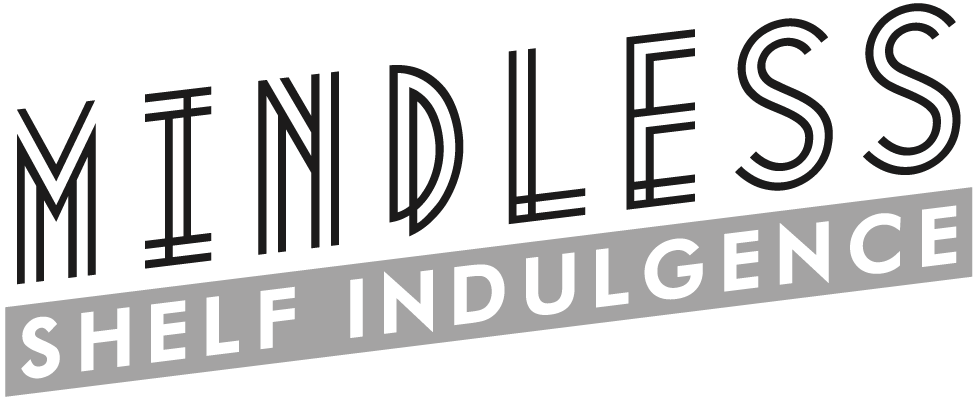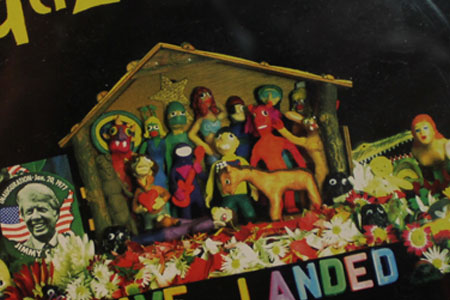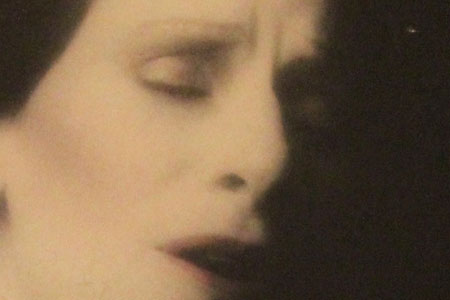By the time you’re reading this episode of Quarantainment, our personal quarantine is at least partially over. We’ve been to a few Goodwills, eaten take-out lunch in the car, and made our way safely back home with an armload of mysterious VHS tapes, a whole lot of small press CDs by local bands, a vintage Fisher Price turntable that still works, and for some reason, a large stuffed goose in a dress. There are absolutely no plans for hotels, movie theaters, indoor dining, or shopping malls in the immediate future, but walking calmly along the outskirts has always been our style anyhow. Isolation can be wonderful, and it’s almost scary that it’s ending. But until then, there are still a whole lot of records to go through.
The rules, as they stand : grab a stack of ten records right off the top of any pile and listen to them one by one, unless it’s something you’re really familiar with already. Headphones help to get the full sonic experience. And it’s something you can accomplish in the background while you work. There’s a certain pathological pain that accompanies throwing something away without experiencing it, trying to understand it, giving it a little corner of your brain. It’s probably a real problem that leads to hoarding, a genetic disposition I’m constantly fighting without too much success.
But for now, working my way through forgotten art feels like the right thing to do. If you like odd or obscure records, here’s part one and part two.
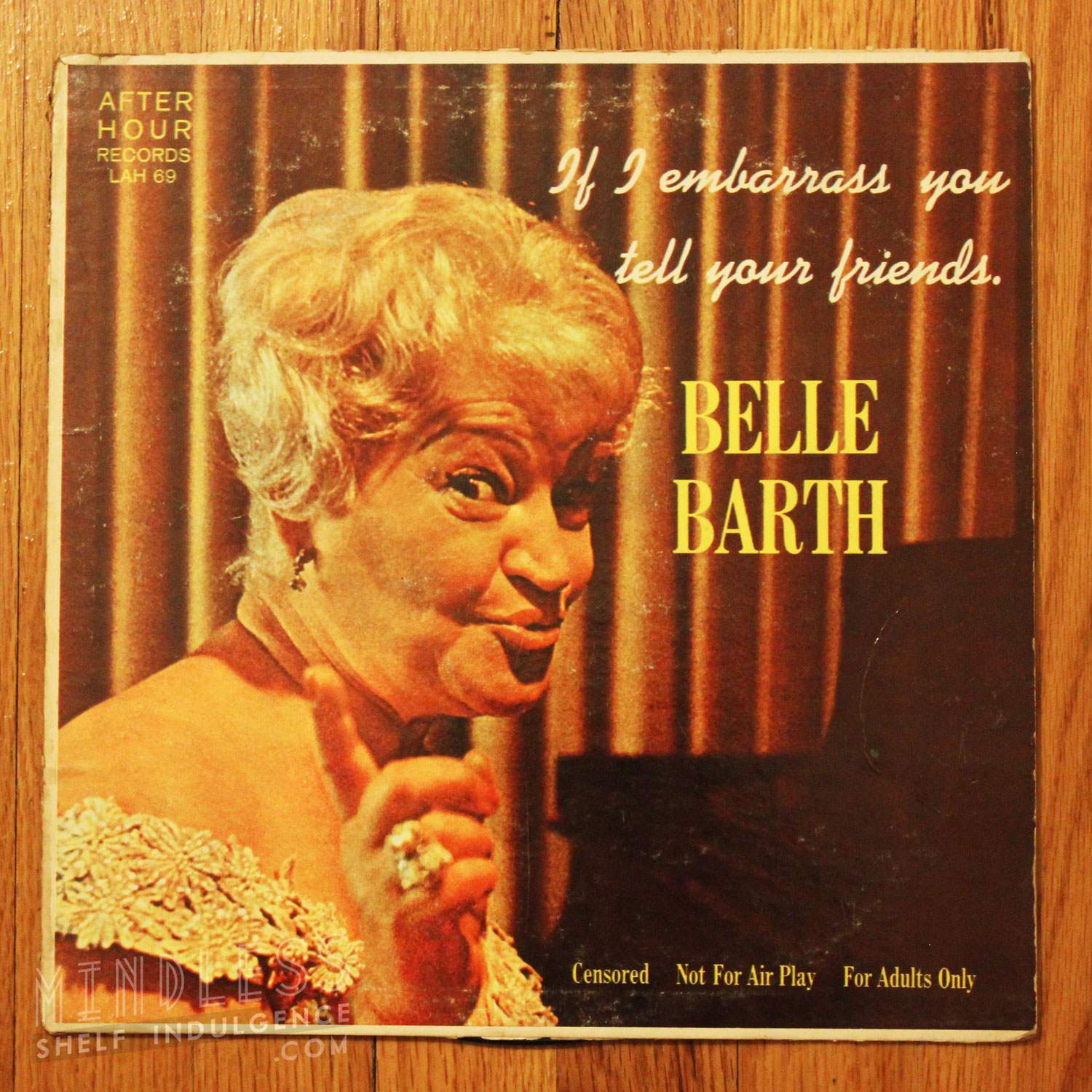
Belle Barth
If I Embarrass You, Tell Your Friends.
[1960]
Somewhere along the line, I must have picked up a small collection of Jewish comedy records. While Myron Cohen is relatively genteel in his prolonged and rapturous storytelling, peppered with endless Yiddish slang, Belle Barth starts out both sides of her record with the same song about how she’s gonna bang 100 men, proceeds into a wide array of genital jokes, and belts out partial songs between each jab. I’m not sure what the earliest instance of the word ‘shit’ being uttered on an LP is, but if you can find one earlier than 1960, let me know.
According to various sources, Barth was charged with obscenity and fined multiple times, but often evaded more scrutiny by using Yiddish slang for things which authorities might not easily recognize, and didn’t really change her act for anyone. Unfortunately, there’s some really harsh slang referring to races and sexual preferences that up in here. It evokes a discussion about the changing nature of words, and their power, and our understanding of persecution and others that really can’t be addressed properly here, but it’s hard to blame Belle Barth for using these words. Language evolves, and it’s just what was being said at the time. There are a couple of good laughs in here, one involving a hunting accident, and another that simply states, “How do you brainwash a Texan? Give him an enema.”
Keep or toss? Well, I spilled coffee on this one (and about half of my office) right after I played it. It’s not a keeper anyhow; while it’s a fun curiosity and a peek back into the darker side of comedy sixty years ago, it’s not something I’m going to lug around.
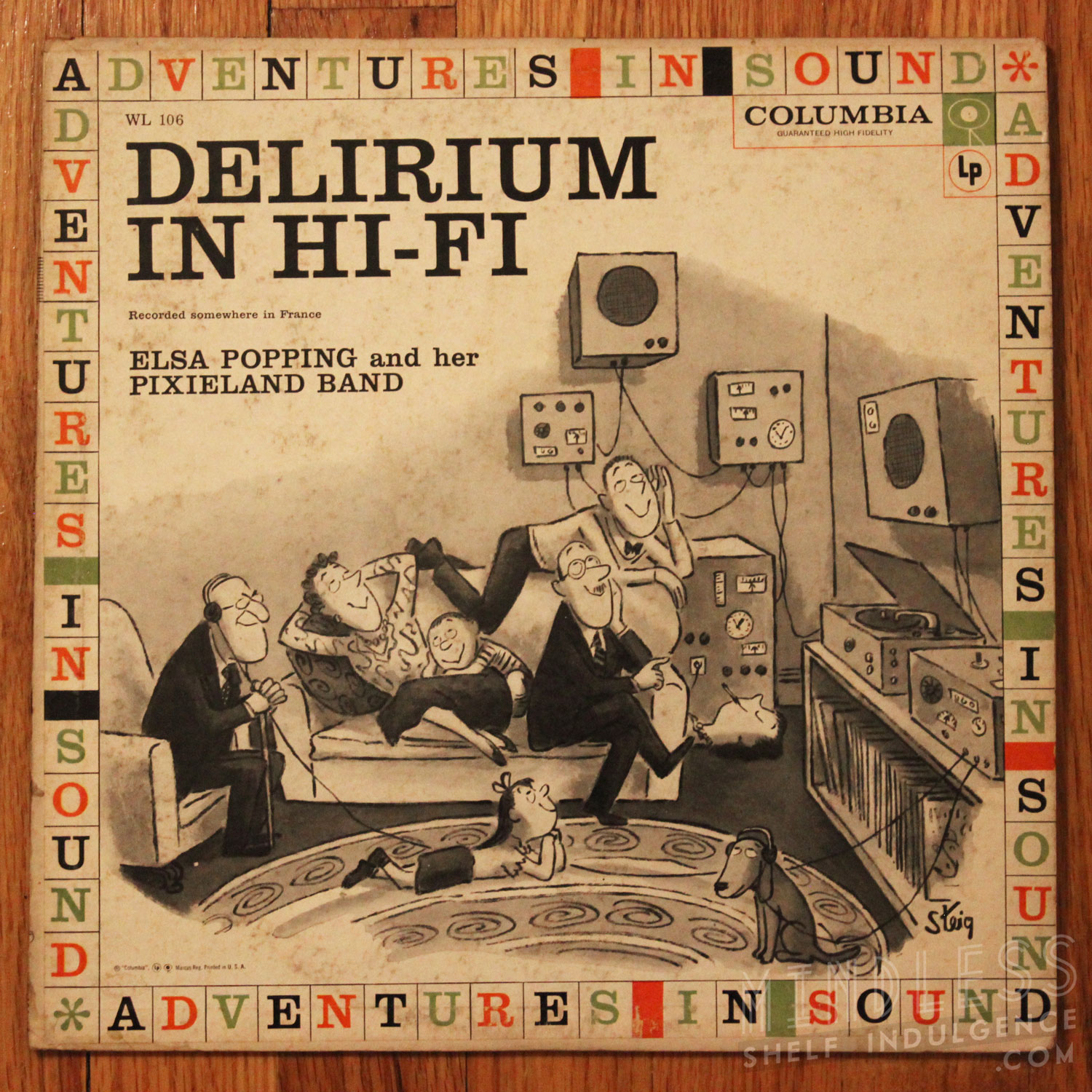
Elsa Popping and her Pixieland Band (Andre Popp & Pierre Fatosme)
Delirium in Hi-Fi
[1958]
This one is a bit of a cheat, as I remember this being one of the earliest ‘weird’ LPs I ever picked up, and it may actually be the real gateway into collecting unfamiliar recordings. I was not disappointed, and it was a rabbit hole into the unusual.
It’s hard to summarize this, other than to say that it’s a very experimental recording full of recording techniques that were new and innovative at the time, mixed with a variety of interesting cartoon sound effects. Playing an instrument at half-speed and then speeding up the recording to make it sound alien, or memorizing words backwards and then singing them and re-reversing them so the phonetic language becomes otherworldly (not unlike what equally experimental They Might Be Giants did many years later for ‘On Earth My Nina’).
All of these bizarro interpretations of standard songs would fit perfectly in any late-50s cartoon about a violent but rubberized war between a cat and a mouse, or a pseudo-industrial or educational cartoon about the atomic age. While none of these experiments are revolutionary today, Space Age music is exceptionally cool – and if you don’t know what that is, just think of the theme song to the original Star Trek.
Keep or toss? Gotta keep this one, even though I spilled coffee on this one too and now I drink from a sippy cup. It’s probably ground zero for my love of odd media, so it’s personally kind of iconic.
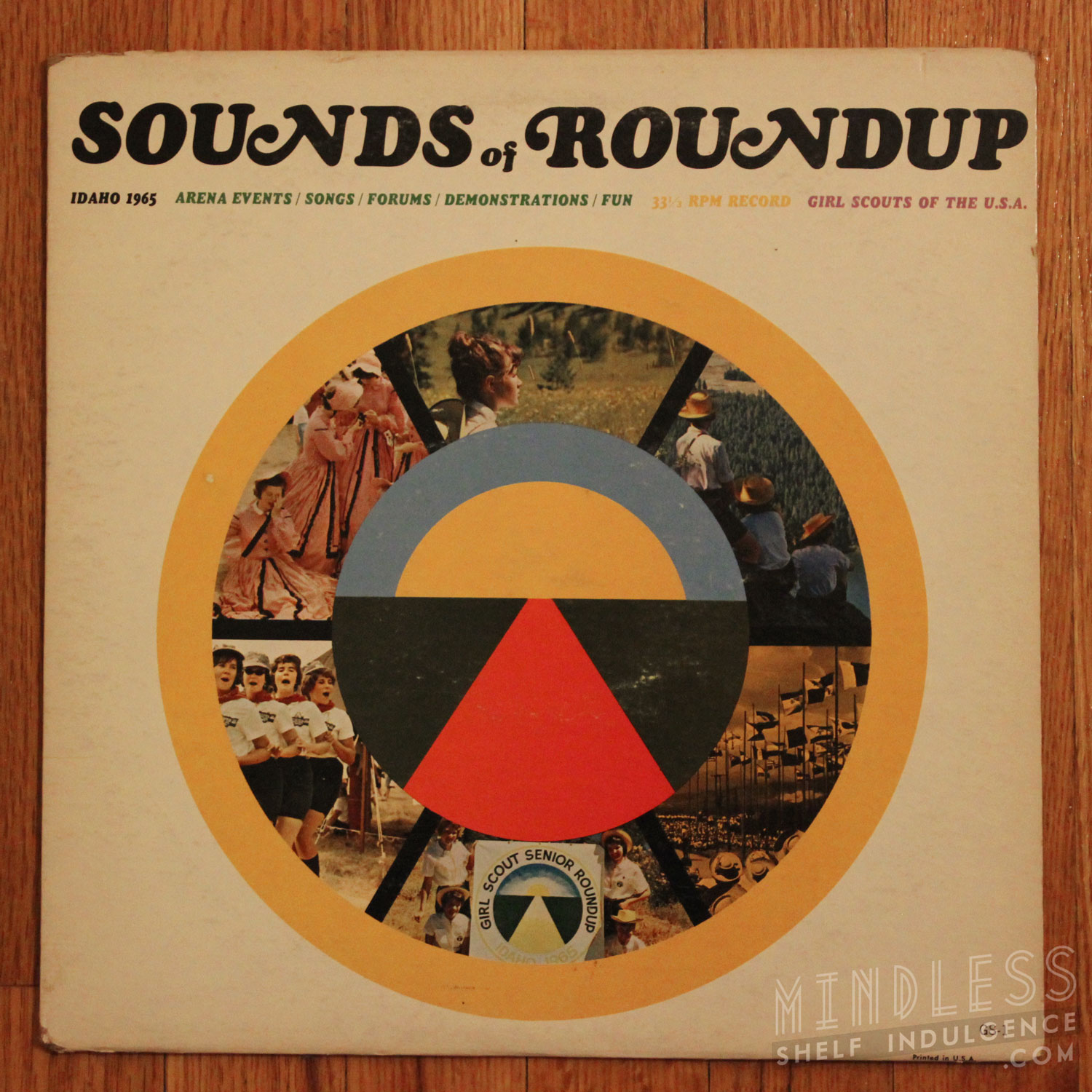
Girl Scouts of the USA
Sounds of Roundup
[1965]
Songs of Roundup is an audio documentary, more than anything else, condensing the 1965 Girl Scouts Roundup in Idaho to about 45 minutes of narration and song. A variety of group events and speeches are recorded, as well as a small handful of musical performances, and a male narrator rapturously describes the wonders of nature of god between each segment. Special guests include weird relatives of the President and VP because the real deals couldn’t attend, and a highlight of the LP is when two girls kinda go at it about if religion is personal or not, and somebody probably got a bug in their sleeping bag later that night, in the name of Jesus.
This was the fourth and penultimate Roundup for the Girl Scouts, and the last until 1986. This wasn’t the only record that came from this enormous meeting. 12,000 Girl Scouts Sing America’s National Favorites was also released as its own LP the same year, chronicling just a bit more of the week-long wilderness adventure in Farragut State park, and how everyone needs to worship god OR ELSE.
If you’re super into the 1965 Roundup, there’s a surprising amount of collectibles that have emerged from that event; pins, trivets, towels, more pins, postcards, and patches – a surprising amount of things for something so niche… but they did have a built-in audience of 12,000 sentimental girls, so these things probably sold pretty well.
Keep or toss? I’ve made myself a copy for posterity, but there’s a pretty bad gouge at the end of the first side that doesn’t seem like it can be repaired, and I have no sentimental attachment to Girl Scouts stuff. Bye, ladies.
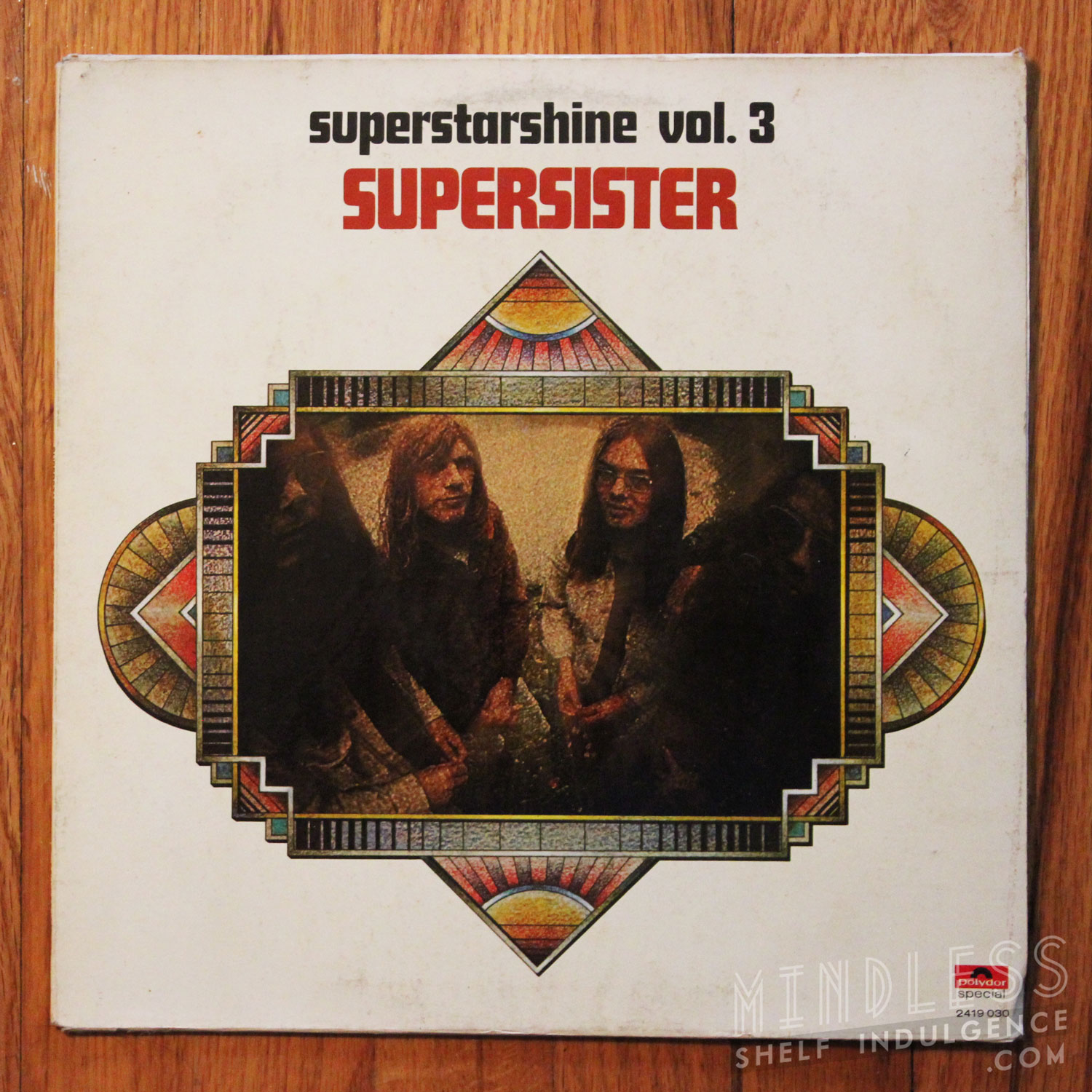
Supersister
Superstarshone Vol. 3
[1972]
I was so out of my depth with this one that I had to look up what genre Supersister was classified under, and apparently, it’s prog rock, even though this compilation touches on so many bizarre things. This collection of songs from earlier albums, as well as a few previously unreleased tracks was released as part of the ‘Superstarshine’ line of records on Polydor, which had a very strong early focus on Dutch rock. The series included 33 records, starting with Golden Earring and Earth & Fire (not to be confused with Earth, Wind & Fire), and eventually evolved through The Beatles, Frank Zappa, and Isaac Hayes, so there was no real rhyme or reason.
The compilation opens with a song, “She Was Naked”, that quickly evolves into some of the hardest psychedelic rock you could ask for, but it almost seems like a parody of a genre more than it is an embrace of the genre itself. This approach became more clear as songs channel Elvis, Bowie, and even a bossanova track, “Radio”, opening up Side 2… but not before Side 1 ends with a weirdly theatrical song cycle about groupies, which parodies gospel, the Beach Boys, and some really hard freakout rock, appropriately called “The Groupies of the Band”. And then Side 2 ends with “Wow”, which is this weirdly improvisational live song that runs for almost 13 minutes and involves the band making weird yelps and goofy voices for a little while, and often breaking out into giggles and a Tiny Tim impression.
Every single song is a surprise, and it’s incredibly playful. It kinda feels like a mix of Zappa and maybe a 1970s version of Ween. It was pretty offputting at first, just because it’s such a wild cacophony of different things coming at you all at once. Maybe a first exposure to Supersister by way of an intentionally weird compilation wasn’t the best approach, but I’ve listened to this four times now, just trying to grasp exactly what’s happening here, so the album wins, and now I’m absolutely intrigued about what else these folks have recorded.
Keep or toss? I normally get rid of compilation albums. I want to hear music as it was originally intended by the musicians. But in this case, this is so weird I can’t get rid of it.
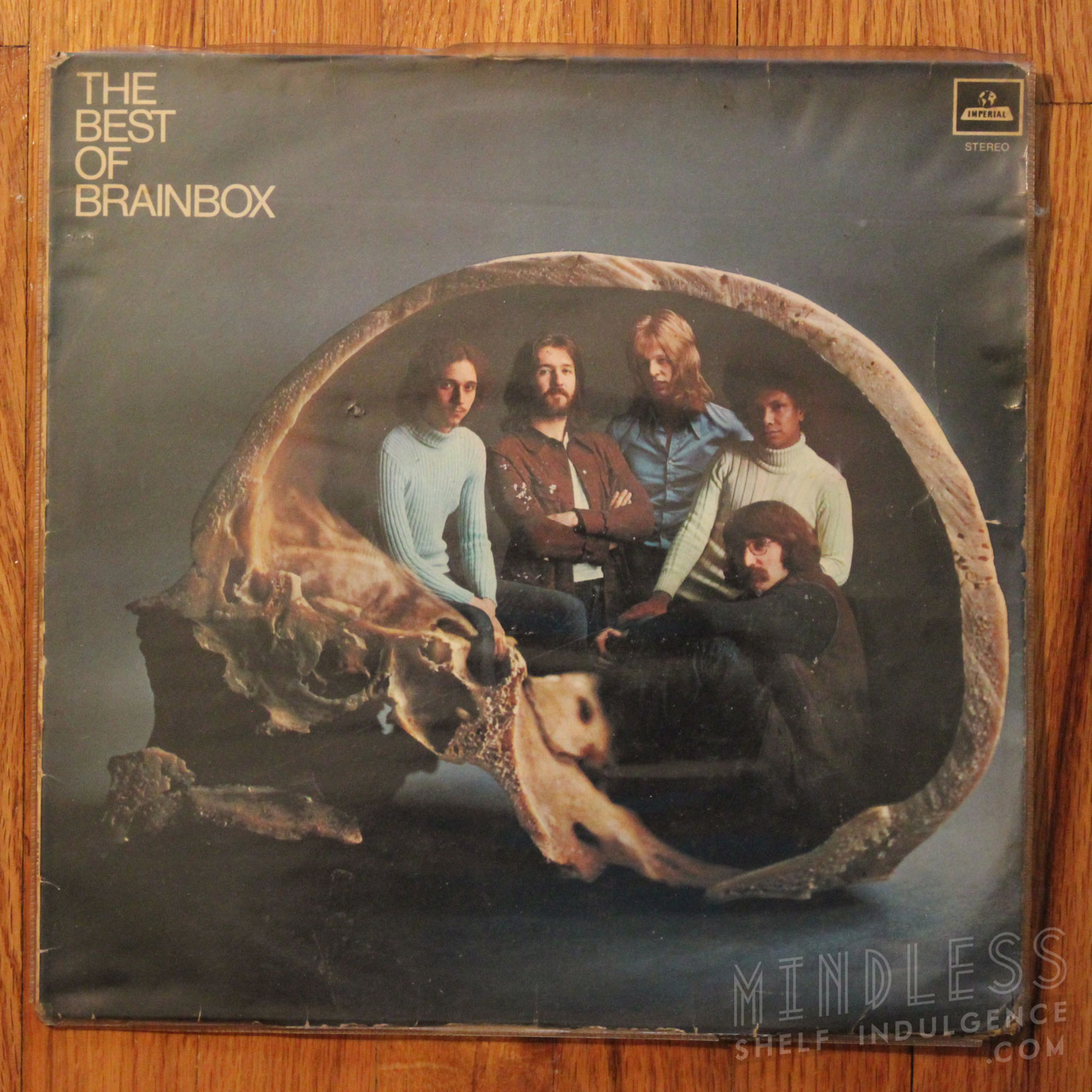
Brainbox
The Best of Brainbox
[1971]
I stumbled into a vein of Dutch rock in my record box, and this one probably has the coolest cover of any I’ve dug out so far : a bunch of 70s dudes sitting around in a giant skull. But I think that’s about as cool as any of this gets for me.
I’m biased against classic rock. I’ve never been able to find room in my heat for most of it, the the exception of the first four Led Zeppelin albums, but a majority of the blues rock that was cranked out in the 70s just doesn’t do anything for me. I even enjoy blues; Leroy Carr’s ‘Good Woman Blues’ has one of the most intense blues lyrics ever written :
“I’ve got so many women : that I don’t care when one dies.”
Brainbox even has the added benefit of throwing in some rock flute on a song or two, and as a huge Jethro Tull fan, this would normally win me over, but it’s just too self serious to pull me in. Even more, the band includes Jan Akkerman, who later went on to form Focus, which is an incredible Dutch prog rock band. When looking for familiar ground, there’s the Brainbox rendition of the classic “Summertime” from Porgy & Bess, and while it’s technically excellent and feels appropriately sweaty and grimy, it’s just not my kind of thing.
Keep or toss? The record sleeve is barely holding together, and the music doesn’t thrill me. Sorry, Brainbox!
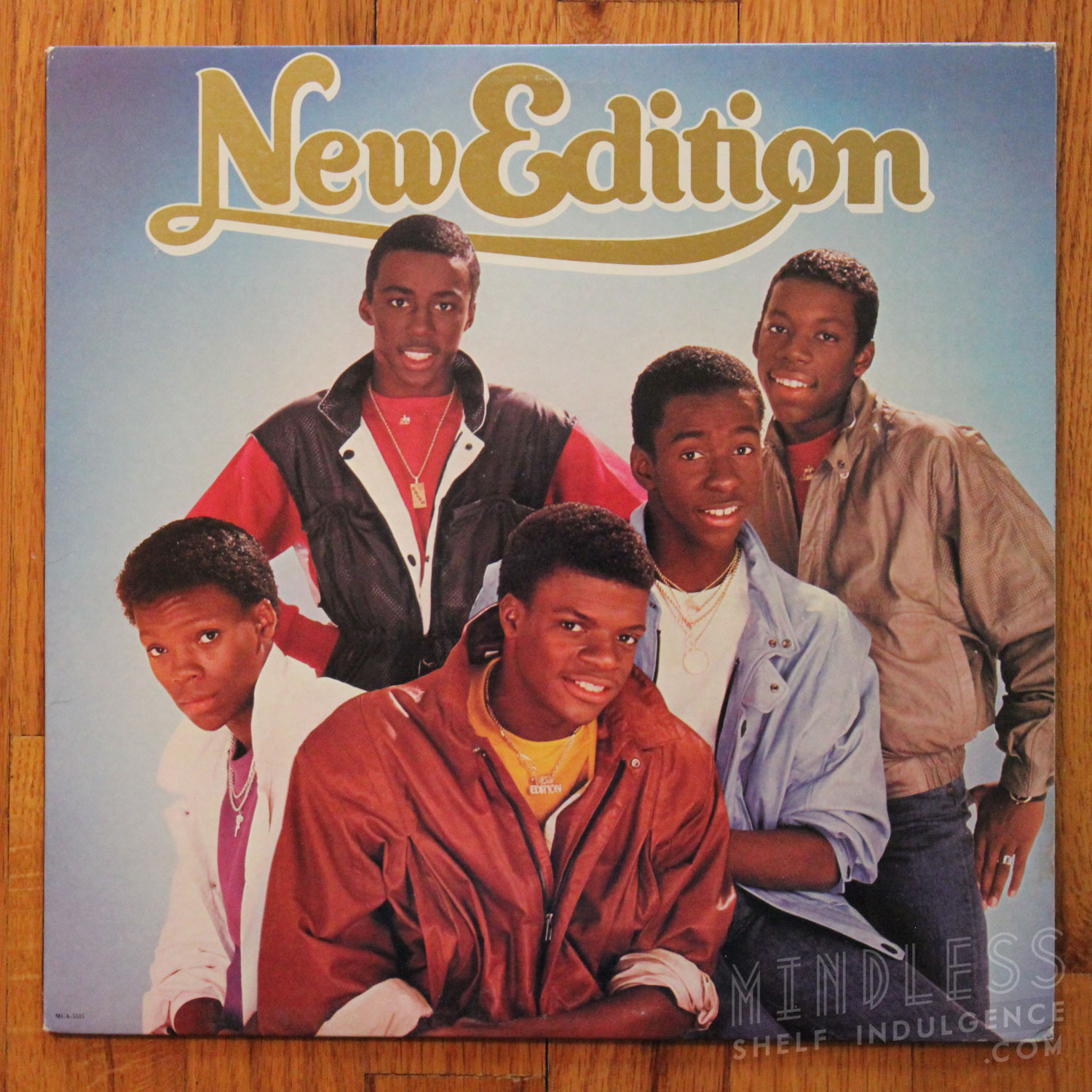
New Edition
s/t
[1984]
Everyone pretty much knows that New Edition is where Bobby Brown got his start, and that Bobby Brown is a pretty terrible person. What I didn’t personally realize is that, at least during this phase of their careers, New Edition is literally children. When I first put on the record, the voices were so high-pitched that I had to make sure I did not accidentally set it to 45 speed. New Edition probably has hundreds of thousands of fans who grew up listening to this in the ’80s, but as an adult with no nostalgia for this, listening to little boys sing about how much they love little girls just feels supremely creepy – no matter how much cool synth they play.
Shortly after this, Bobby Brown was allegedly voted out of the band because he kept on stealing other members’ solos.
Keep or toss? Given the choice between listening to a bunch of kids sing about how hard life is for them and a possible $5 payout on eBay, I’ll go with eBay every time.
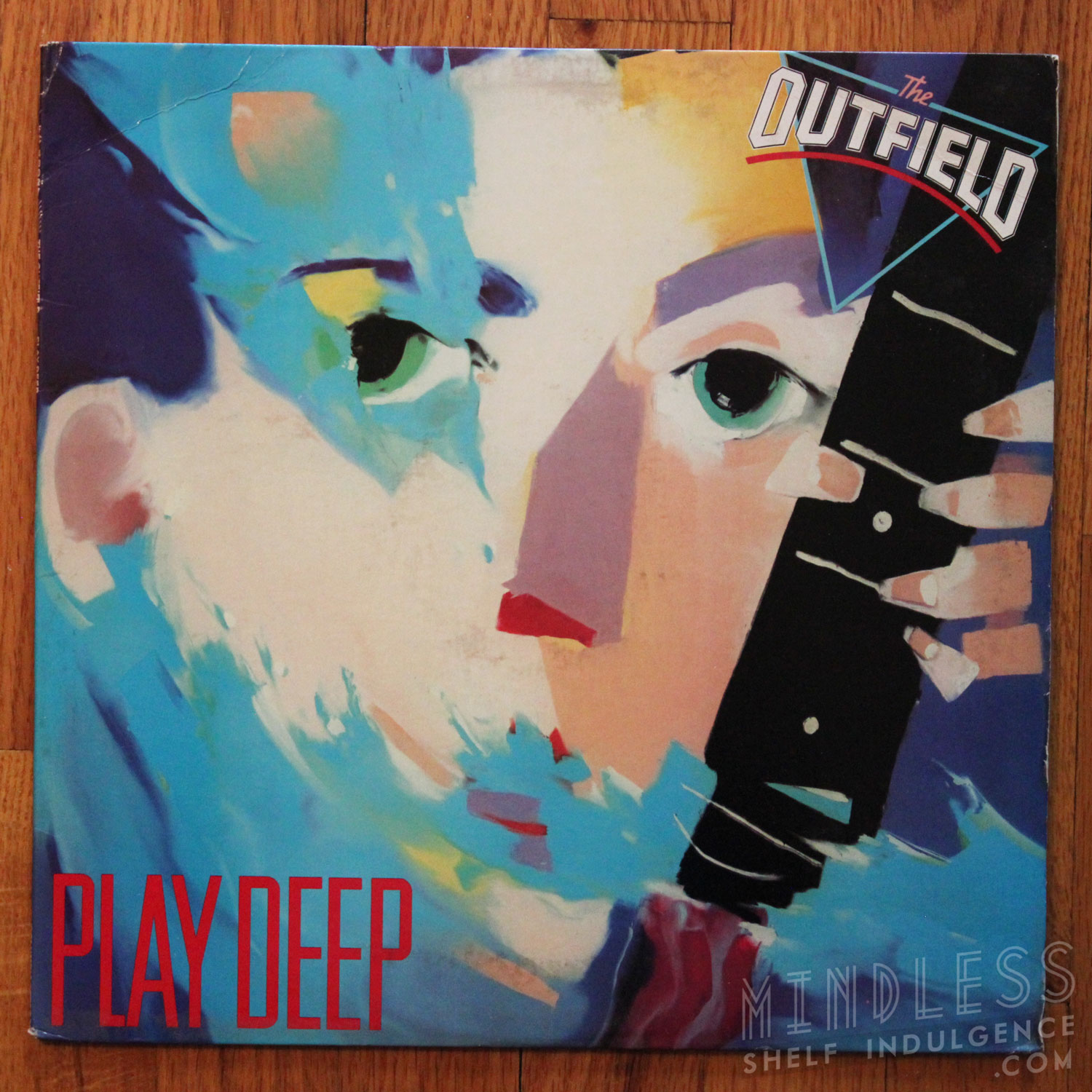
The Outfield
Play Deep
[1985]
You don’t know you’ve heard The Outfield, but you have. And you may have even been reminded of them recently, with the unfortunate and sudden passing of lead vocalist Tony Lewis in 2020. In terms of sales, The Outfield peaked with this first album; three more albums charted but never again broke the top 10, and five further still never charted. Only four or five or them were titled with baseball puns., and It Ain’t Over probably gets some kind of reward for one of the world 90s album covers, alongside Men Without Hats’ Ivan and his album The Spell, which looks like it’s an ad for an energy drink that will also give you 15 free hours of AOL.
The Outfield kinda fill a spot that The Police left behind, but with a much heavier tendency towards late-80s echoey pop rock ballads, which have their place. Like all of these well-known albums, it’s populated by incredibly talented people, but there’s not much I can say that hasn’t been said by smarter people.
Keep or toss? “Play Deep” just doesn’t fit into the New Wave niche that I love, even after a few listenings. The record is also badly warped enough that it makes the sound wobbly. This record has struck out.
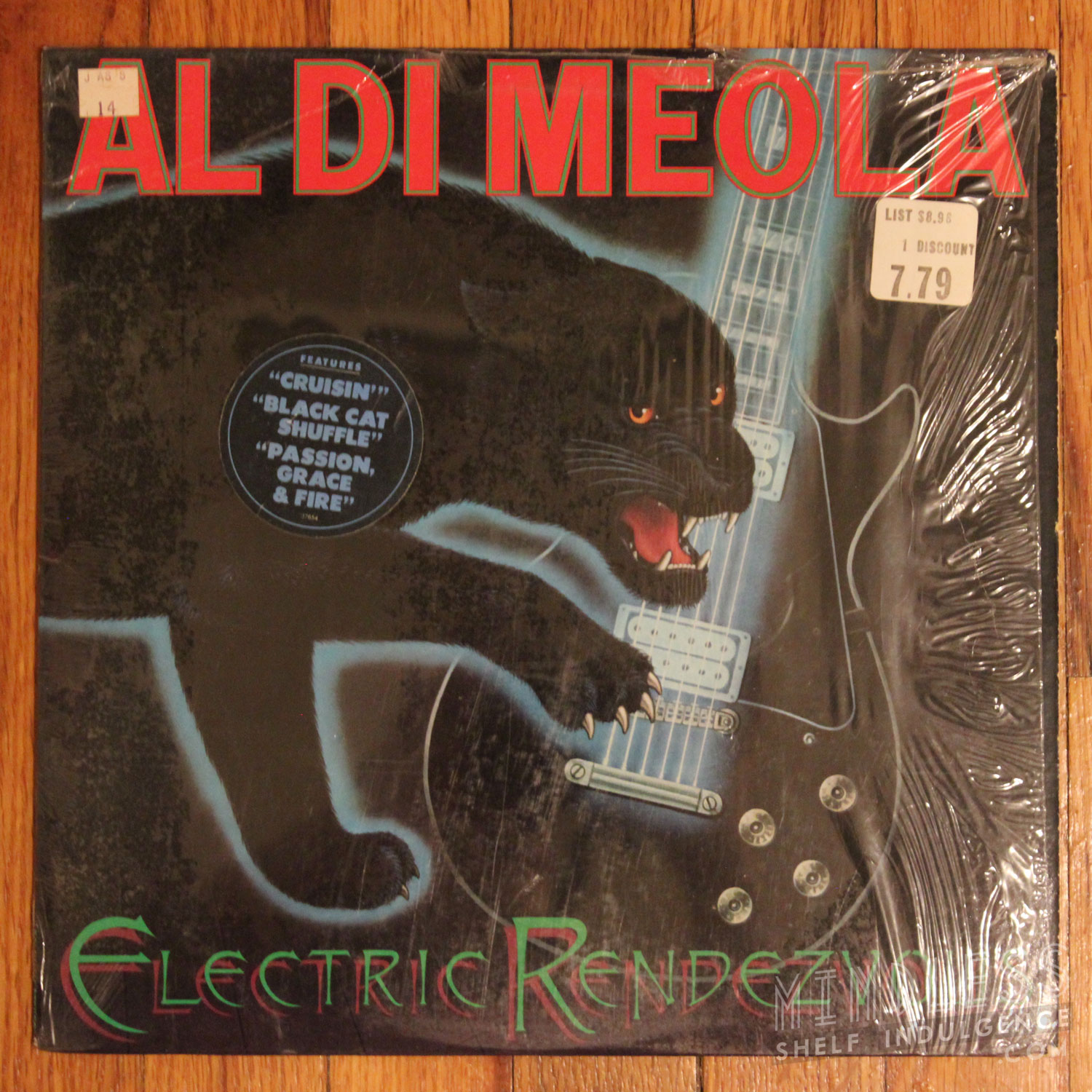
Al Di Meola
Electric Rendezvous
[1982]
Obviously grabbed for the badass cover, I didn’t realize that Al Di Meola was basically a guitar virtuoso, so all I can do is speak of this album for the uninitiated like myself. It’s all over the place in a good way. “God Bird Change” is an electrified, funky thing with synths and lapses into jungle beats. “Electric Rendezvous” gets pretty metal, and it’s definitely a piece meant to explore a lot of different feelings in one long stretch of coherent music. “Passion Grace & Fire” gets into Flamenco. He’s a guy who knows how to do everything, and he does it here.
Cover artist Mark Hess has done a ton of album covers, though most of them are portraiture, and occasional diversions into photography as well. This cover is a pretty odd example from his catalog of works, which are generally more soft and airy.
Keep or toss? One of the criteria I’ve learned to love is “Would you put this on at a cool party?” I think that the answer here is yes. It’s unintrusive, has no lyrics to interfere with conversations, and if I ever make enough friends to have parties, I’d probably let this one spin for a while. Still a little on the fence, though, as I would probably not put this on for personal enjoyment.
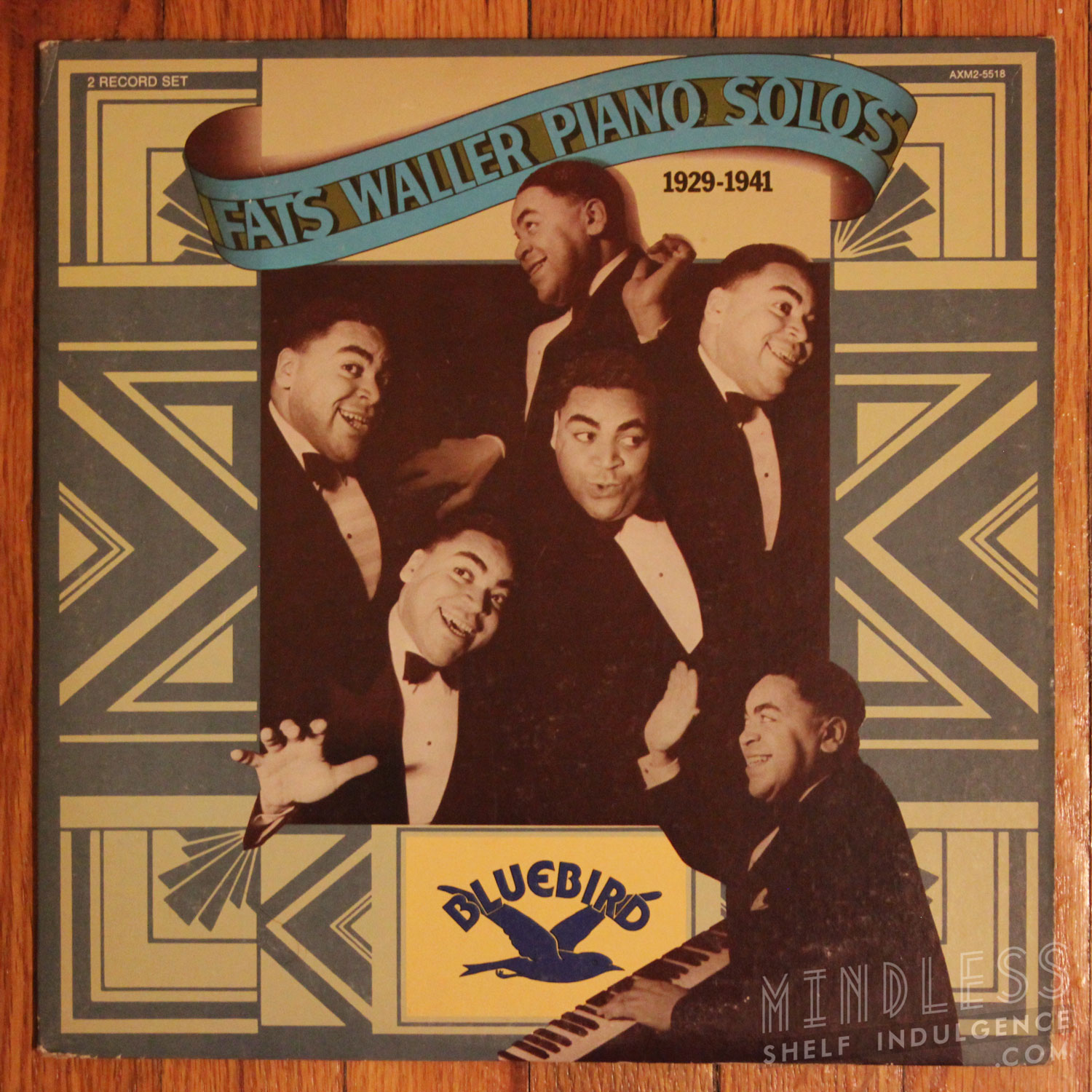
Fats Waller
Fats Waller Piano Solos
[1977]
If it sounds like it belongs in the background of a Betty Boop cartoon, I like it. Do I like it for two full records, presented in glorious mono with some weird thumping noise through the first set of songs? Not so much. I don’t know if it’s a bad disc, or if there are other things at play, but my turntable has a new needle and the record is pristine, and I don’t have this problem with any other record… but there’s some guttural uneven clicking happening through a good portion of these songs that’s really getting under my skin.
This is a rare case where I’ll have to abandon this entirely to preserve my sanity. Fats Waller is a legend. He was instrumental in the formation of jazz. But in terms of having a little bit of his catalog for myself, you can find his music just about anywhere. But if you like really upbeat, classic cartoon music, go for it!
Keep or toss? This is going into the donation pile. Sorry, Fats. I just need a cleaner recording of this if we’re going to be spending any time together.
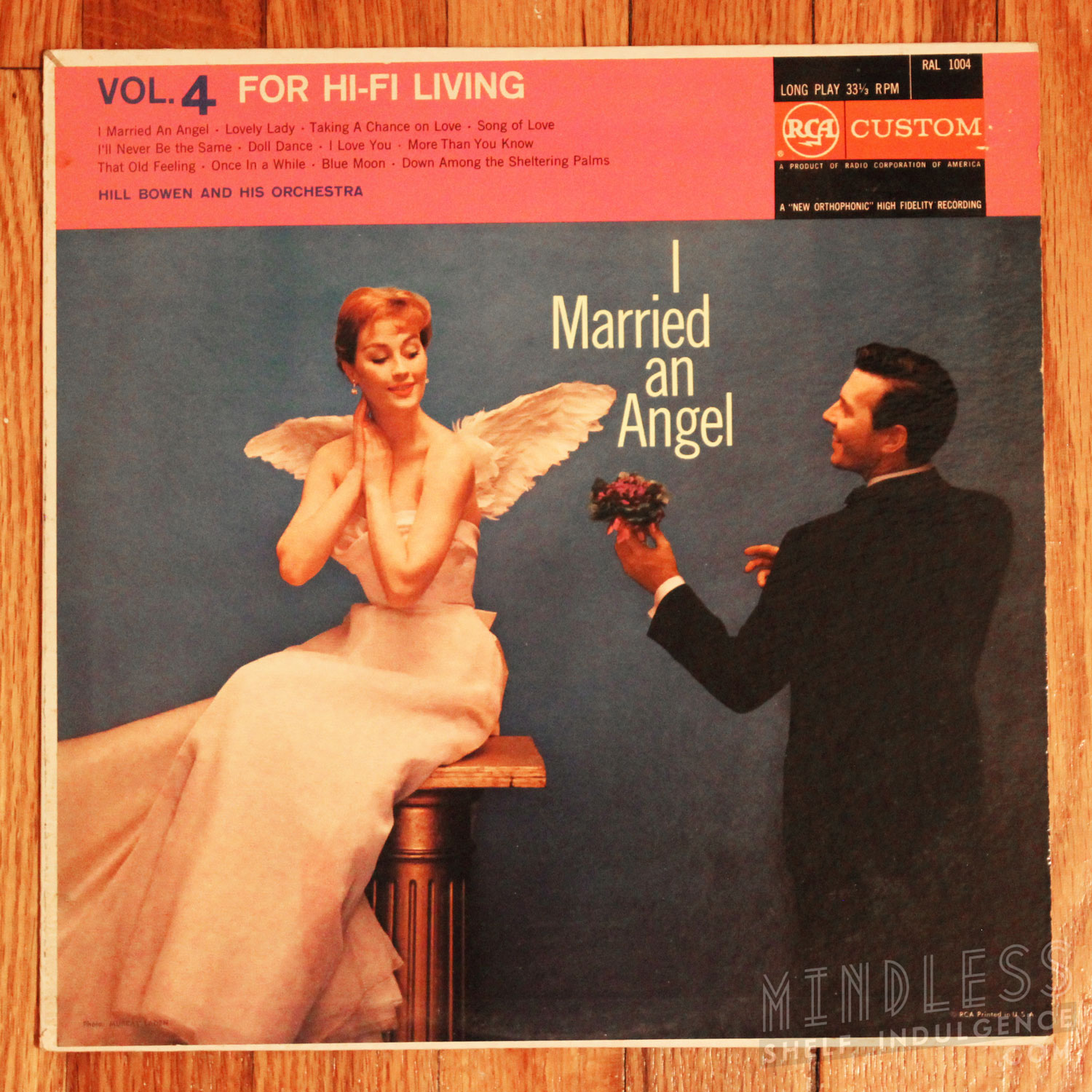
Hill Bowen & His Orchestra
Vol. 4 for Hi-Fi Living : I Married an Angel
[1957]
What’s the 1950s equivalent of shovelware? It’s gotta be something like the Hi-Fi Living series from RCA. This series of 12 albums was all released in 1957 and contain a set of what can only be described as Lawrence Welk standards : sanitized, orchestrated, completely smooth-cornered slow dancing music for old people. It’s almost offensively saccharine. This kind of thing is the bane of thrift shops, right alongside Christmas albums and classical. Sure, there are gems in all three types of record bin cancer, but if you find something like this in your collection, get rid of it! It’ll multiply and take over all of your precious record-collecting space.
According to Discogs, Hill Bowen released most of his records for Reader’s Digest, another maker of all-consuming LP shovelware.
In another life, it might be fun to collect all 12, just as some kind of personal collecting challenge, but the cost of intentionally collecting all 12 volumes would outspend any amount you could get by reselling the whole lot together. As of now, exactly zero listed copies have sold on eBay, and Discogs records show that many sell for just about a buck. If I find any more of these in my collection, I’m not even going to look at them. It’s sweet, whatever.
Keep or toss? Launch it into the sun.
That’s ten more records sorted. Would a reasonable person just glance at the covers and toss things out without this much curation? Probably, but curation is most of the fun. Learning about art makes better art. Looking for the unknown leads you to exactly where you’re supposed to be, so take the time to be surprised.
 C. David is a writer and artist living in the Hudson Valley, NY. He loves pinball, Wazmo Nariz, Rem Lezar, MODOK, pogs, Ultra Monsters, 80s horror, and is secretly very enthusiastic about everything else not listed here.
C. David is a writer and artist living in the Hudson Valley, NY. He loves pinball, Wazmo Nariz, Rem Lezar, MODOK, pogs, Ultra Monsters, 80s horror, and is secretly very enthusiastic about everything else not listed here.